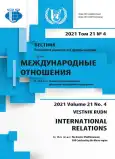German-Algerian Relations by the Early 2020s in the Context of the Germany’s Regional Policy: Political and Military Aspects
- Авторлар: Trunov P.O.1
-
Мекемелер:
- Institute of Scientific Information for Social Sciences of the Russian Academy of Sciences (INION RAS)
- Шығарылым: Том 21, № 4 (2021): The Greater Mediterranean: Still Constructing the Macro-region
- Беттер: 683-699
- Бөлім: THEMATIC DOSSIER
- URL: https://journal-vniispk.ru/2313-0660/article/view/320275
- DOI: https://doi.org/10.22363/2313-0660-2021-21-4-683-699
- ID: 320275
Дәйексөз келтіру
Толық мәтін
Аннотация
Since the beginning of the 21st century, there has been a noticeable increase in German efforts to ensure security in the Mediterranean Sea. This is part of the growing activities to ensure a strong strategic position in North and West Africa, including the settlement of existing armed conflicts here as sources of threats to instability for Germany and its EU partners. Consequently, Germany found itself increasingly interested in finding reliable strategic partners, one of which is Algeria, which makes the topic of this article relevant. The purpose of the study is to examine bilateral security and defense relations with a special focus on the second half of the 2010s and early 2020s with the help of comparative and event-analysis. Having an applied character, this topic has not yet found detailed coverage in the works of both domestic and foreign, especially German, researchers. The historic background of the German-Algerian dialogue is presented. The growth of high-level contacts in the second half of the 2010s is shown, with Germany having to focus on negotiations with the frequently changing figure of the Algerian prime minister. The article also explores the constraints for the cooperation of German and Algerian armed forces on land and sea, as well as the dynamics of military-technical cooperation. The bilateral cooperation in the resolution of the armed conflict in Mali, first of all, in its northern region (Gao, Kidal and Timbuktu) is considered. The political and diplomatic cooperation on the Libyan track in the middle and second half of the 2010s, as well as shortly after the Berlin Conference on Libya in January 2020, is revealed. In the early 2020s, there was a sharp decline in the intensity and volume of bilateral cooperation in almost all areas. In addition to COVID-19, the importance of domestic political factors and the temporary decline in the practical value of the partnership in Libya and Mali for Germany are stressed. A forecast of the dynamics of bilateral relations is finally given.
Негізгі сөздер
Авторлар туралы
Philipp Trunov
Institute of Scientific Information for Social Sciences of the Russian Academy of Sciences (INION RAS)
Хат алмасуға жауапты Автор.
Email: 1trunov@mail.ru
ORCID iD: 0000-0001-7092-4864
PhD in Political Sciences, Senior Research Fellow, Department of Europe and America
Moscow, Russian FederationӘдебиет тізімі
- Bogucharskiy, E. М. (2008). Diplomacy and foreign policy of independent Algeria: Evolution of main directions and priorities. Vostok. Afro-Aziatskie Obshchestva: Istoriia i Sovremennost, (2), 123-136. (In Russian).
- Borodkina, N. V. (2013). France - Algeria: From political rhetoric to political action (the end of the 20th - beginning of the 21st century). Asia and Africa Today, (6), 30-35. (In Russian).
- Vasetsova, E. S. (2017). Algeria in the context of regional security in the Near East. Vek Globalizatsii, (4), 82-91. (In Russian).
- Zhirnov, O. A. (2007). German policy in the African continent. Current problems of Europe, (3), 114-133. (In Russian).
- Kazarinova, M. I. (2017). The key German interests in the Mediterranean region. Panorama, 29, 16-21. (In Russian).
- Tkachenko, K. A. (2011). External economic links of Germany with the countries of Northern Africa. Asia and Africa Today, (9), 57-61. (In Russian).
- Khannanova, G. A. (2017). Specifics of German foreign policy in the Middle East and North Africa, Vestnik RUDN. International Relations, 17(4), 760-769. (In Russian). https://doi.org/10.22363/2313-0660-2017-17-4-760-769
- Hanish, M. (2015). A new quality of engagement Germany’s extended military operation in Northern Mali. Bundesakademie für Sicherheitspolitik. Arbeitspapier Sicherheitspolitik, (8), 1-5.
- Harder, М. (2013). Anforderungen an eine Europäische Maritime Sicherheitsstrategie. SWP-Aktuell, (43), 1-4.
- Kaim, M. (2013). Deutschland und das internationale Konfliktmanagement in Mali. SWP-Aktuell, (8), 1-4.
- Kinzel, W. (2020). Mali, der Terror im Sahel und Covid-19. SWP-Aktuell, (27), 1-4. https://doi.org/10.18449/2020A27
- Klute, G. (2013). Tuareg-Aufstand in der Wüste. Ein Beitrag zur Anthropologie der Gewalt und des Krieges. Köln: Rüdiger Köppe Verlag.
- Lacher, W. (2018). Das Milizenkartell von Tripolis. SWP-Aktuell, (4), 1-4.
- Lacher, W. (2021). Unser schwieriger Partner. Deutschlands und Frankreichs erfolgloses Engagement in Libyen und Mali. SWP-Studie, (3), 1-42. https://doi.org/10.18449/2021S03
- Lacher, W., & Tull, D. M. (2013). Mali: Jenseits von Terrorismusbekämpfung. SWP-Aktuell, (9), 1-8.
- Major, C., Schulz, R., & Vogel, D. (2020). Die neuartige Rolle der Bundeswehr im Corona-Krisenmanagement. SWP-Aktuell, (51), 1-8. https://doi.org/10.18449/2020A51
- Mousli, M. (2019). Algerian-Russian cooperation: True strategic partnership? Vestnik RUDN. International Relations, 19(2), 284-292. https://doi.org/10.22363/2313-0660-2019-19-2-284-292
- Mühlhausen, A., & Riedel, S. (2015). Algerien zwischen Transformation und Kontinuität. Stabilisierung autoritärer Herrschaft am Rande des Arabischen Frühlings. SWP-Arbeitspapier FG Globale Fragen, (1), 1-51
- Peifer, D. (2016). Why Germany won’t be dropping bombs on Syria, Iraq or Mali. Orbis, 60(2), 266-278. https://doi.org/10.1016/j.orbis.2016.02.008
- Pinfari, M. (2012). Tunisia and Lybia. In J. Peters (Ed.), The European Union and the Arab Spring. Promoting democracy and human rights in the Middle East (pp. 33-47). Lexington: Lexington Books.
- Pusztai, W. (2015). Libyen: Was wurde falsch gemacht? Bundesakademie für Sicherheitspolitik. Arbeitspapier Sicherheitspolitik, (13), 1-4.
- Tull, D. M. (2017). Mali und G5: Ertüchtigung des Sicherheitssektors. SWP-Aktuell, (76), 1-4.
- Tull, D. M. (2019a). Rebuilding Mali’s army: The dissonant relationship between Mali and its international partners. International Affairs, 95(2), 405-422. https://doi.org/10.1093/ia/iiz003
- Tull, D. M. (2019b). UN peacekeeping in Mali. SWP Comment, (23), 1-4. https://doi.org/10.18449/2019C23
- Werenfels, I. (2018). Migrationsstratege Marokko - Abschotter Algerien. In A. Koch, A. Weber & I. Werenfels (Hrsg.), Migrationsprofiteure? Autoritäre Staaten in Afrika und das europäische Migrationsmanagement (pp. 25-37). Berlin: Stiftung Wissenschaft und Politik
Қосымша файлдар









